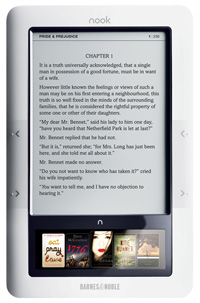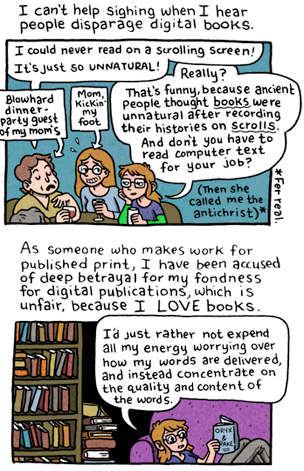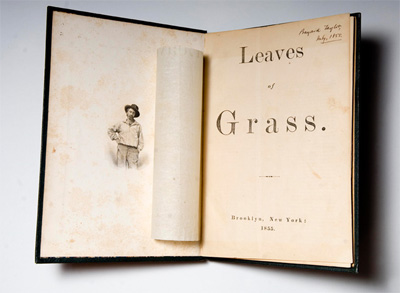 Head over to Literary Kicks to try your literary knowledge against a cool puzzle. Guess what the picture is of and what it has to do with a book. This kind of thing can keep you going for hours while you hunt through your book collection for clues and learn about fascinating web sites you never knew existed. I spent quite some time going comfortably down quite the wrong track with this little puzzle. But then… Aha! My mistake became obvious.
Head over to Literary Kicks to try your literary knowledge against a cool puzzle. Guess what the picture is of and what it has to do with a book. This kind of thing can keep you going for hours while you hunt through your book collection for clues and learn about fascinating web sites you never knew existed. I spent quite some time going comfortably down quite the wrong track with this little puzzle. But then… Aha! My mistake became obvious.
Tag Archives: Books
Barnes & Noble Nook is a Dreadful Failure
 I’ve been so waiting with my bated breath and all for this magical Nook machine from Barnes & Noble. I was in a right dither tonight about an hour and a half ago as I shoved my reading glasses into my pocket, put my regular glasses on my face and piled into my car for the short ride to my nearest Barnes & Noble bookseller. But I stopped first at the Lenscrafters to run in and have them adjust my frames because my glasses are so new and have been drifting over lopsided all week. So the woman there fixed them up nicely and shined them good. Then I drove on toward my Nook encounter.
I’ve been so waiting with my bated breath and all for this magical Nook machine from Barnes & Noble. I was in a right dither tonight about an hour and a half ago as I shoved my reading glasses into my pocket, put my regular glasses on my face and piled into my car for the short ride to my nearest Barnes & Noble bookseller. But I stopped first at the Lenscrafters to run in and have them adjust my frames because my glasses are so new and have been drifting over lopsided all week. So the woman there fixed them up nicely and shined them good. Then I drove on toward my Nook encounter.
The store had a lone unit attached to an anti-theft device that scared the hell out of me because I tend to demonstrate new devices to myself until nearby customers think I’m a lunatic and I certainly didn’t want to raise any alarms. The Nook said, ‘Press the Power Button to Wake Up.’ I spun the device around several times until I located said button embedded in the upper edge of the Nook. I pressed it.
I waited.
Then I pressed it perhaps fourteen or fifteen times to try and make something wake up. Then the screen went through a series of blinks, flashes and some rather frightening symbols appeared and then disappeared. And then the machine said, ‘Press the Power Button to Wake Up.’
Planisphere: New Book of Poems by John Ashbery
 Poet John Ashbery has published a new book of poems called Planisphere. Boy, I hated this guy’s poems a few years ago. But I kept reading them because of some instinct for self-inflicted mental damage. And I kept reading him. Not understanding him at all. But I liked the words as they passed me by. They sort of slide on by you. Smooth, but switching and becoming something totally unexpected, unrelated to what just happened before. His poems sort of shimmer and seem a bit brittle, like glass. When you read this guy you certainly know that you are not reading someone else. He’s in his eighties, but his work seems like a young man’s. He has a gently rebellious foolishness that I greatly admire.
Poet John Ashbery has published a new book of poems called Planisphere. Boy, I hated this guy’s poems a few years ago. But I kept reading them because of some instinct for self-inflicted mental damage. And I kept reading him. Not understanding him at all. But I liked the words as they passed me by. They sort of slide on by you. Smooth, but switching and becoming something totally unexpected, unrelated to what just happened before. His poems sort of shimmer and seem a bit brittle, like glass. When you read this guy you certainly know that you are not reading someone else. He’s in his eighties, but his work seems like a young man’s. He has a gently rebellious foolishness that I greatly admire.
His publisher, Harper Collins, has a preview of his new book that offers quite a few of the poems.
So does this sound like the writing of an eighty-year-old?
I dream of married couples having sex, shopping, everything,
and often get the giggles, staying here,
expecting something new to come along every five seconds.
That’s new to me, I expect others will have heard about it.
B—’s Mysterious Greeting
And here’s the guy:
A Cartoonist Wonders About the Fuss Over Digital Books
 Cartoonist Lucy Knisley has a comic online called ‘Downloading Optimism: Pessimism Virus Detected.’ It’s a funny but very direct assault on the tendency in some quarters to fret and worry about the emergence of digital books and online reading as the driving force behind the new world of publishing. She doesn’t understand why some of our most creative writers and artists are feeling so gloomy about their prospects in a digital publishing world.
Cartoonist Lucy Knisley has a comic online called ‘Downloading Optimism: Pessimism Virus Detected.’ It’s a funny but very direct assault on the tendency in some quarters to fret and worry about the emergence of digital books and online reading as the driving force behind the new world of publishing. She doesn’t understand why some of our most creative writers and artists are feeling so gloomy about their prospects in a digital publishing world.
She’s been reading enormous amounts of online text since she was a little girl. Her point of view is dead on the money. One little thing I know is that I began publishing for kids online back in 1995. The kids came and were reading lots of stories. Let’s say a bunch of them were only 5. Well, they’re 20 now, and they are making it plain that they want their books on screens just as often as they might want them on paper. You ignore them at your peril.
I found this comic via Boing Boing
Remember the Book?
 Remember the book? Of course you do, because you have plenty of them in shelves, half-read, dusty, bent, torn, coffee-stained, wine-colored, smudged, smelly, misprinted, broken and cherished. They catch your glance as you walk from one room to another, reminding you of a year or a moment when you were doing something else but had that book in your bag or backseat and meant to finish it or did in fact, and put it away and moved it several times in a box, cursing its weight and trying not to bend it. So there it sits now, quite possibly closed until the day you die. But you know it’s there and it’s a marker in your life. Remember this thing with books?
Remember the book? Of course you do, because you have plenty of them in shelves, half-read, dusty, bent, torn, coffee-stained, wine-colored, smudged, smelly, misprinted, broken and cherished. They catch your glance as you walk from one room to another, reminding you of a year or a moment when you were doing something else but had that book in your bag or backseat and meant to finish it or did in fact, and put it away and moved it several times in a box, cursing its weight and trying not to bend it. So there it sits now, quite possibly closed until the day you die. But you know it’s there and it’s a marker in your life. Remember this thing with books?
And LPs of vinyl? Mine used to function like books in my shelf. But I put them into a closet years ago because of CDs. Now I can’t stand searching a shelf of CDs, so I mainly use MP3 files. My albums no longer work as markers of life and time. The same thing is happening to books. All of mine are still on the shelves. But the world is changing and books are beginning to look a lot like information that wants to weigh less. It doesn’t matter how one feels about this, whether it makes us sad or not. It’s a creeping fact. Our books are turning into wonderful collector’s items. I can tell this is happening partly from all the excitement and business surrounding these e-reader devices. Books will continue to play an important role in literature but they will gradually be eclipsed by some other technology. The current e-readers are not necessarily it, but they are the harbingers of things to come. We are lightening our load because we can’t carry it around forever. We’ll have to travel light. Walt Whitman wouldn’t mind though, because he’d want to travel with us.
But this fellow, Raymond Danowski, has amassed the largest collection of 20th Century English poetry books in the world. He collected over 70,000 books, periodicals, and artifacts. The collection includes a first edition of Whitman’s Leaves of Grass, printed by the poet himself. It also has a first edition of T.S. Eliot’s Prufrock and Other Observations. There are so many books that when he donated the entire collection to Emory University in Atlanta, it took volunteers over a year just to unbox all the volumes. The university is now the major center for researching 20th Century English poetry books.
I’d like to see that collection. It must be fascinating. And anything is worth touching that Walt Whitman touched. Seeing books is the thing. They have a presence in a room, lining its walls and giving it enormous depth. But we are engaged in a process of making our books invisible. What will we put in their place? I’m not really too worried about that because when you turn all those words into digital form you present yourself with infinite possibility. When words float around in the air you are in the realm of magic beyond anything any book could have ever accomplished. Then again, sometimes just touching a book is enough to send your mind wandering down an unexpected path. Can touching a virtual keyboard have the same effect? Does it have to have the same effect? Maybe not. I’m sure banging a chisel into a clay tablet did things to a mind that ancient peoples were loath to part with.
Does the emergence of a world without books frighten or worry you? Do you see something wrong with a world in which literature is simply information that travels wirelessly? Do you think that ink is inherently superior to bits?
Eventually, we will read War and Peace by passing someone on the street and glancing into their eyes for a brief moment. That person will give us the book as nothing more than a polite ‘How do you do?’ At that point, we will remember books the way we remember the clay tablet.
Publishers Doomed by Predatory Book Pricing? So what?
John Grisham on NBC’s Today Show discusses his new book, writing novels versus short stories, and so-called predatory book pricing by large retailers like Walmart, Target and Amazon.com. I like Grisham in this interview. He’s a good interview and he seems sharp. He talks about how it’s much more difficult to fix a problem in the middle of writing a novel than to do so with a short story. So he advises writers to ‘not have a problem.’ The trick is to thoroughly outline your entire novel before you even start to write it so that you know every single thing that happens along the way. Pretty sound advice in most cases. Not all. Some of the greatest novels in the world were written by writers who had absolutely no idea where the novel was going from page one. It depends on what kind of book you’re writing. I think his advice is perfectly good for most books that are intended for sale in a grocery store. Certainly. But writers should never listen to famous writers. They’re full of crap. You write what makes you sweat and drink lots of coffee late into the night and bang your fingers on your keyboard until they hurt. Or not. Whatever. I hate outlines. Especially in word processors. Awful things. They destroy good minds and belong mostly in PowerPoint presentations for corporate managers. I’m not sure what the hell Grisham is talking about quite frankly. But then again, I’m not selling thrillers in the grocery store either.
But what mainly interests me in this interview is the discussion about ‘predatory pricing’ by the giant retailers. Apparently, if you listen to publishers, this spells doom for publishing and book selling as we know it. When asked what he thinks about his latest book being available for nine dollars at Target, Grisham says:
It’s shortsighted. Short term, they know what they are doing, I think. But if a book is worth $10 then suddenly the whole industry is going to change. You are going to lose publishers and book stores, and though I’ll probably be alright, aspiring authors are going to find it difficult to get published.
Yeah? So what. So we lose publishers and book stores. Who cares? The key in Grisham’s statement is where he says, ‘…and though I’ll probably be alright.’ He means writers will be alright. The big scary fact of the matter is that we simply don’t give a tiny damn whether or not a publisher prints a book or an author does. Publishers read, accept, edit, design, print and promote books. At least they used to. I don’t care what anyone tells you, but we do not need the editors. Writers can do that. You write the book and you edit it and you’re done with it. Readers are getting used to reading writers without editors. That’s why blogs are so popular. No editors. If you have an editor poking around in a blog, trust me, it’s not a blog. It’s a corporate front-end. A writer can also design and print a book. And sell it. Writers are publishers. No reader cares about Penguin. They care about the guy holding the gun. The guy holding the gun is put there by the writer. Writers will make guys, guns and gals forever. It’s what they do and it’s what readers want.
I don’t care if the guy with the gun says, ‘I’ve been looking for you for a long time, Mr. Peabody. Smile, because it’s the last thing you’ll ever do.’ Or if he says, ‘I’ve been looking for you. Smile. It’s your last.’
The writer can pick. The editor can go watch Kitchen Nightmares.
There is absolutely no excuse for a writer to work hard on a story, hammering it into existence from nothing, polishing it and making it exactly what he or she wants it to be… and then sit around to wait for some agent or publisher to get back via the U.S. mail so that said writer can be allowed to move on and send out yet another plea for acceptance. This is old technology. Twentieth century. It’s gone. In this century a writer writes and edits and publishes and sells. His book can sell in Target for nine dollars or three dollars. Magnificent. Literature available to people who don’t make lots of money. What a novel idea! If you’re griping about Target selling books for nine dollars, you must not be buying books. Go watch His Girl Friday and pretend that typewriters still make newspapers.
And you know something else? The guy with the gun doesn’t care. He’ll always be there. He’s not going anywhere. All the publishers and book stores could burn and all the editors could go to their early graves, and you know what? The guy with the gun is still gonna getcha. He’s going to find you wherever you go. He’s alive.